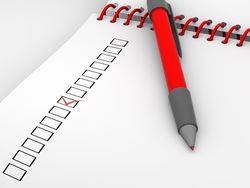 Counsellors may also use client satisfaction or feedback forms as a way of collecting information which can help them monitor effectiveness (McMahon, 1998). For those involved in research the need to design questionnaires which are both Valid and Reliable is given considerable importance. Validity means the questionnaire measures what it claims to measure and reliability means results would be consistent if the questionnaire was administered in the same circumstances to a range of individuals (Saunders, Liptrot, 1993).
Counsellors may also use client satisfaction or feedback forms as a way of collecting information which can help them monitor effectiveness (McMahon, 1998). For those involved in research the need to design questionnaires which are both Valid and Reliable is given considerable importance. Validity means the questionnaire measures what it claims to measure and reliability means results would be consistent if the questionnaire was administered in the same circumstances to a range of individuals (Saunders, Liptrot, 1993).
In an ideal world it would be helpful if client feedback forms were always valid and reliable. However, a counsellor does not have to see their lack of understanding or skill in designing such questionnaires as an overwhelming problem. Such forms provide an opportunity for the counsellor to collect information in a reasonably consistent manner. Feedback forms and questionnaires such as these can be helpful but they should also be treated with care. It would be unhelpful if a counsellor believed the information gleaned from such a questionnaire could do more than ‘flag up’ areas for consideration. For example, satisfaction ratings have their limitations as clients may have such low expectations of the counselling process that their high rating would not truly reflect the quality of counselling or the degree of change achieved. A client may have liked their counsellor and therefore find it difficult (even after counselling) to be assertive, therefore rating the counsellor more highly.
Reflective practice can take many forms from those that are based on only monitoring the counsellor’s internal work to techniques which attempt to employ external evaluation and feedback. Whatever the techniques used, reflective and evaluative processes help the counsellor become a better practitioner, the clients receive better counselling, the counselling world learn more about the needs of individuals and the counsellor remain curious about their practice and its effects.
Previous posts in this series:
Reflective Practice and Self-Evaluation
Keeping a Professional Development Log
Reflecting Through Counselling Supervision
References:
Sanders, P, Liptrot, D (1993), Research Methods & Data Collection for Counsellors, An Incomplete Guide Series, Manchester : PCCS Books
Bayne, R, Horton, I, Merry, T, Noyes, E, McMahon, G (1999), (2nd Ed) The Counsellor’s Handbook – A Practical A-Z Guide to Professional and Clinical Pracice, London: Chapman & Hall
